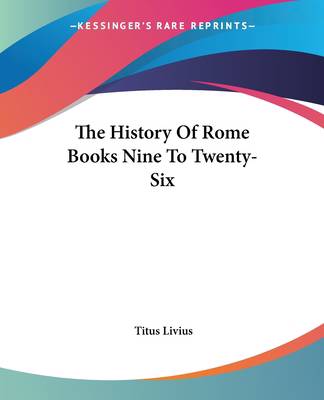
- Afhalen na 1 uur in een winkel met voorraad
- Gratis thuislevering in België vanaf € 30
- Ruim aanbod met 7 miljoen producten
- Afhalen na 1 uur in een winkel met voorraad
- Gratis thuislevering in België vanaf € 30
- Ruim aanbod met 7 miljoen producten
Zoeken
Omschrijving
The History of Rome Books Nine to Twenty-Six is a collection of historical texts written by the ancient Roman historian, Titus Livius. The book covers the period of Roman history from the end of the Second Punic War in 201 BC to the death of the Roman Emperor Augustus in AD 14. Livius' work is a comprehensive account of the political, military, and social developments of Rome during this period, including the rise of Julius Caesar, the fall of the Roman Republic, and the establishment of the Roman Empire. The book also provides insight into the cultural and religious practices of Rome, as well as its interactions with other civilizations such as Greece and Carthage.Livius' writing style is characterized by his attention to detail and his use of vivid descriptions to bring historical events to life. The History of Rome Books Nine to Twenty-Six is a valuable resource for anyone interested in ancient Roman history and the development of Western civilization.Being disturbed with these anxieties, he so conducted himself for five years in the African war, which commenced shortly after the peace with Rome, and then through nine years employed in augmenting the Carthaginian empire in Spain, that it was obvious that he was revolving in his mind a greater war than he was then engaged in; and that if he had lived longer, the Carthaginians under Hamilcar would have carried the war into Italy, which, under the command of Hannibal, they afterwards did. The timely death of Hamilcar and the youth of Hannibal occasioned its delay.This scarce antiquarian book is a facsimile reprint of the old original and may contain some imperfections such as library marks and notations. Because we believe this work is culturally important, we have made it available as part of our commitment for protecting, preserving, and promoting the world's literature in affordable, high quality, modern editions, that are true to their original work.
Specificaties
Betrokkenen
- Auteur(s):
- Uitgeverij:
Inhoud
- Aantal bladzijden:
- 428
- Taal:
- Engels
Eigenschappen
- Productcode (EAN):
- 9781419166327
- Verschijningsdatum:
- 17/06/2004
- Uitvoering:
- Paperback
- Formaat:
- Trade paperback (VS)
- Afmetingen:
- 190 mm x 238 mm
- Gewicht:
- 725 g

Alleen bij Standaard Boekhandel
+ 102 punten op je klantenkaart van Standaard Boekhandel
Beoordelingen
We publiceren alleen reviews die voldoen aan de voorwaarden voor reviews. Bekijk onze voorwaarden voor reviews.











